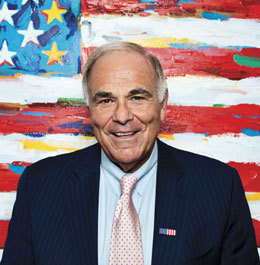
Ed Rendell’s plan to get America back to being a nation of risk-takers unafraid of doing “big, bold things”
The fire in his belly burning hotter than ever, Ed Rendell simply refuses to go gently into that good night.
Whereas some politicians step quietly into the background after their terms expire, Rendell has remained very much in the public eye, jamming his schedule overfull with jobs, causes and interests that suit his style. In truth, he’s likely just as busy now as he was as Philadelphia’s district attorney or its beloved mayor or, most recently, governor of the Keystone State.
These days, this part-time Ocean City resident fills his calendar practicing law with national firm Ballard Spahr, analyzing politics for NBC and Eagles games for Comcast SportsNet, co-chairing Building America’s Future, which is an organization devoted to strengthening the country’s infrastructure in urban and rural areas alike, and, of course, trying to ignite a revolution that would get America back to taking risks, making tough decisions, and speaking its mind.
Helping the nation rediscover its boldness is one of the main reasons he wrote the recently released A Nation of Wusses: How America’s Leaders Lost the Guts to Make Us Great. (“For a book that has no sex and no violence,” he says, “it’s doing very well.”) The title of the book stems from an incident in December 2010, when a football game between the Philadelphia Eagles and the Minnesota Vikings was canceled due to a looming snowstorm, long before a single flake had fallen. Afterward, an incredulous Rendell rather famously proclaimed that America was becoming “a nation of wusses.”
He may be right, but it’s not too late for us. South Jersey Magazine recently sat down with the 68-year-old Rendell to discuss how America—and, more so, its leaders—can get back its boldness, his next move, and, of course, his take on the Eagles’ Super Bowl chances this season.
SOUTH JERSEY MAGAZINE: The book’s
title is as provocative as the statement
that gave birth to it, after the so-called
Eagles Game that Never Was.
ED RENDELL: I had never heard of canceling a
football game for bad weather. The San Diego
Chargers in the ‘70s played a game at Cincinnati
for the AFC championship and the wind chill was
minus 63 degrees and they still played the game.
The Eagles in 1951 played for the NFC championship
against the Cardinals in an 11-and-a-half-inch
blizzard. Nobody even thought of canceling
the game, and [halfback] Steve Van Buren, who
was the equivalent of Tom Brady at the time—
he was the star Eagles player and the star of the
NFL—he took two trolleys and a bus to get to the
stadium in time to play the game. And I thought
to myself, if this was Green Bay or Minnesota or
even Pittsburgh or Buffalo, people would say,
“What? They canceled the football game?” It bothered
me, but when I reflected on it for a second,
I realized that it sort of became a symbol of what’s
happening to us as a country.
One example I gave was our relationship
with China. I’m all for free trade … but China has
without a doubt manipulated their currency to
give Chinese businesses a huge advantage
over American businesses. They have stolen our
intellectual property, and the Chinese government
has done nothing to police that. They dump product
in the United States to undercut our businesses
and drive them out of business so they end American
competition, and we don’t do anything. We
say, “Please stop.” And the answer is, “We can’t
do anything because they own all of our debt.”
Well, of course that’s true, but we buy most of their
product, and if we stop buying their product, their
economy would go into the crapper in four
months. So we have as much leverage on
them as they do on us. It’s time to stand up and
say, “No more currency manipulation. If you continue
to do it, you’re not going to send product
into the United States.” We just don’t have the
backbone to do that.
SJM: When did this “wussification” start
occurring?
ER: It happened with the advent of 24-7 media,
because every act is reported almost instantaneously.
Whereas the media used to report the
news, the media is now in the opinion business,
and the opinions are sledgehammers. You’ve got
right-wing opinions, progressive opinions, and
anyone who wants to get together and do some
things that are risky but necessary gets the [stuffing]
kicked out of them.
There’s an inability to do anything that’s risky
at all. The reason this is so poignant is that this
nation was built by risk-takers. We were a
bunch of shopkeepers and farmers who had the
audacity to think we could take on the greatest
army and navy in the world—the British—and we
knew what the consequences were; the men who
signed the Declaration [of Independence] knew
that if we lost, that they would be hung, and yet
they did it. They were the ultimate risk-takers. We
were risk-takers when we built the Erie Canal,
when we built the Hoover Dam, when we built
the railroads and the interstate highway systems.
We were risk-takers, and we did big, bold things.
JFK took a huge risk when he said we’ll put
a man on the moon before the end of the
decade. My favorite Kennedy quote was when he
made that announcement, he said, “We do
these things not because they are easy but because
they are hard.” So this nation of risk-takers
has turned into a nation of wusses. And I don’t
mean the people, necessarily. We also don’t respect
the intelligence of our people. … We don’t
have the courage to tell people the truth.
SJM: So what can we do about it?
ER: After the election, whoever is the president elect
has to lead and say, “Look, the only way
we’re going to meet the challenges, the only way
we’re going to get through it without falling over
the fiscal cliff, is for us to take bold steps,
which involve taking risks and ticking people off,
but I’m going to lead and I’m going to take most
of the weight and you guys follow and do the
right thing.”
SJM: Your “nation of wusses” comment
probably got more press than the canceling
of the game. Were you surprised?
ER: I had to laugh. I quoted a Daily News
reporter, Will Bunch, who ran a story
about it the next day, and [his story] basically
supported what I said. He said, “If
this was China, 65,000 Chinese would
have walked to the game doing advanced
calculus as they walked.” I repeated that
quote and newspapers in Shanghai and
Beijing quoted me, saying it was my
quote, but I was stunned to think that a
comment about a football game would
wind up in newspapers in Shanghai.
SJM: For those of us who haven’t gotten
to the book yet, what takeaways do
you think people will come away with
after reading it?
ER: I wrote the book for three reasons. First,
particularly for young people, I wanted to communicate
that although public service is very
difficult—it’s low pay, bad working conditions,
you’re scrutinized all the time, often you’re in
can’t-win situations, it’s highly pressurized—
despite all those things, it’s a wonderful way
to live. Your work product, your talent and your
energy is going into changing people’s lives
on a daily basis. I hope it would inspire people
not just to run for office but to work in government,
to work in nonprofits, to put themselves
in a position to get that feeling.
The second reason I wrote the book was to
debunk this idea, which has gained ground politically,
that government is the enemy, that government
can’t do anything right, that the best government
is the least government, that we don’t
want the government spending money. Using myself
and others as an example, government,
when it’s targeted and effective and cost efficient
can do wonderful things to help people—to create
opportunities, to protect the most vulnerable
citizens, to promote growth—and I think I demonstrated
how I did it and how other people along
the way have done it.
The third takeaway is that, yeah, we need
leaders who are going to have the courage to start
taking some risks and not worry about protecting
their own job, and that’s an important part of
breaking the stalemate and the logjam that exists
not only in Washington, D.C., but in most state capitals.
For us—we the people—we need to continue
to reinforce and support those politicians who do
take risks. We can’t expect them to be risk-takers
if we punish them for every risk that they take that
doesn’t pay off. It’s almost like we the people have
to give our leaders permission slips to take risks.
SJM: What’s the biggest lesson you
learned from your time in politics?
ER: Hopefully you learn from your mistakes. My
biggest mistake was the one time I wussed out
when I agreed with the legislature to give them
the pay raise [in 2005]. They had threatened me
that if I didn’t sign the bill that they would never
pass anything I was interested in again, and I had
five years ahead of me. I should have realized
it was a bluff, and I should have called their bluff,
and I didn’t. Lesson No. 2 I learned, and maybe
this is just my style of management, but it’s very
important for the person in charge to be involved
in everything—one, because the person in
charge usually gets to be in charge because they
have a level of talent and experience; two, because
in the end, you’re going to take the hit for
it no matter what.
SJM: You and Philadelphia are almost
synonymous, but I understand you have
strong South Jersey ties as well.
ER: My wife [Marjorie] and I own two properties
in Ocean City, and we’ve been going down
there for four decades. We love South Jersey and
we love the Shore, but I also love Voorhees and
Cherry Hill and Camden County; they’re part of
Philadelphia. I’ve seen when I’m in other cities,
I’ll meet someone from Cherry Hill and I’ll say,
“Where are you from?” And they’ll say, “Philadelphia.”
We’re one big metropolitan area. There are
as many diehard Eagles fans in South Jersey as
there are in South Philadelphia.
SJM: You’re busy enough as is, but what’s
next for you?
ER: I want to continue doing what I’m doing. I
love the work I’m doing with Mayor Bloomberg
on Building America’s Future. I love the work I
do for NBC. I love making speeches and getting
paid for it. I love the work I do for my law firm,
and they’ve been very good to me in the sense
that they allow me to bring in clients that I want
to bring. I also teach at Penn and I do the sports
shows, so I do a lot of different things. I’m enjoying
my life.
The only two jobs I would leave what I’m doing for would be—not necessarily in order of importance—baseball commissioner, which in some ways is my dream job, and secondly would be if Hillary [Clinton] runs in 2016, I would be her campaign manager and I wouldn’t charge her a dime. And then if Hillary got elected, I might consider doing something with her in D.C., but there’s no certainty she’s even going to run.
Published (and copyrighted) in South Jersey Magazine, Volume 9, Issue 8 (November, 2012).
For more info on South Jersey Magazine, click here.
To subscribe to South Jersey Magazine, click here.
To advertise in South Jersey Magazine, click here.












